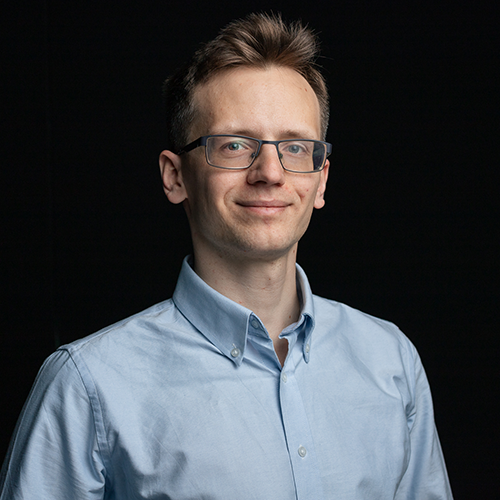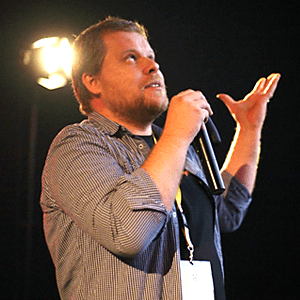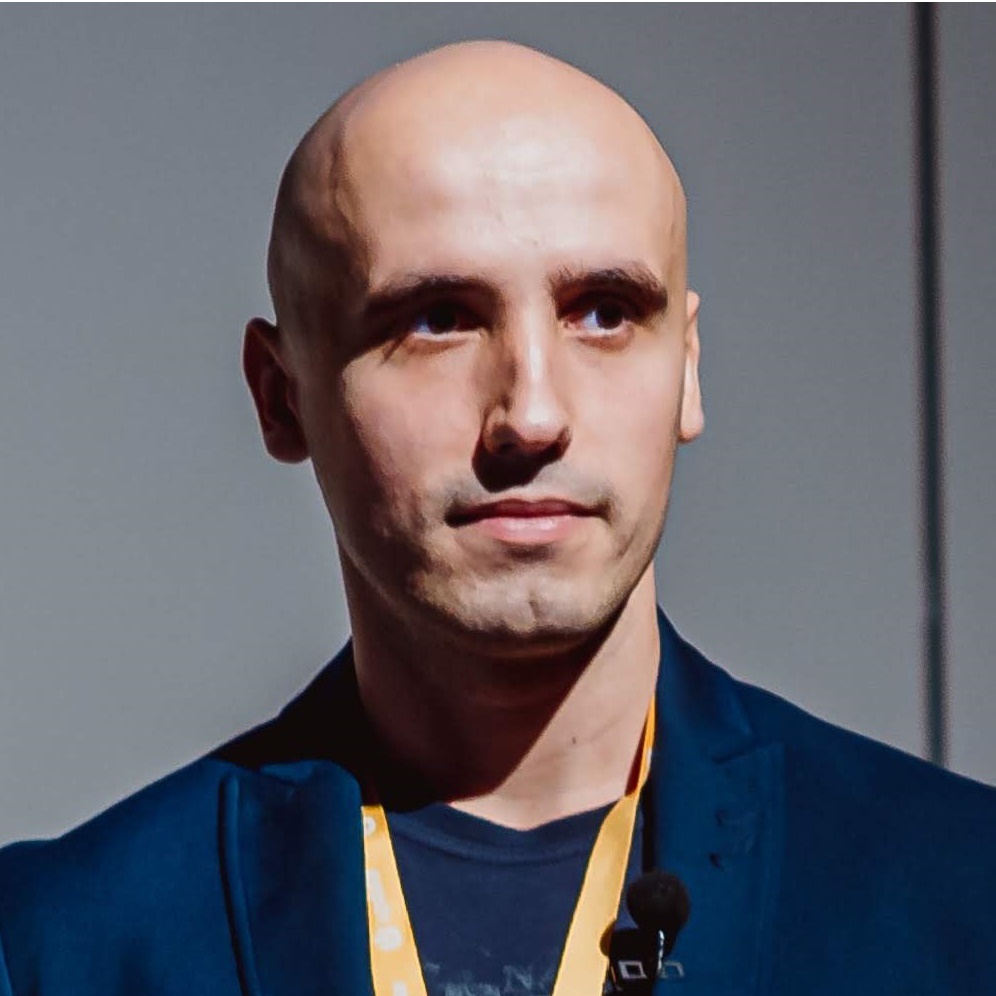#99: Nix and Nix OS. How? Why? What for?
Nix promises reproducible packages. But… why?
NixOS, on the other hand, is a Linux distribution with a very strange proposition: do everything differently and it’ll be great.
The first question that comes to mind is: why would anyone do this to themselves? But the second one is even more intriguing: why does everything else start to feel pointless afterward?
We’ll start with a quick intro to what these tools actually are, move through the beautifully simple developer environments you can build with Nix, and end with the unique powers NixOS offers as a distribution.
REGISTER
For over a dozen years, I’ve been building and maintaining large and small infrastructures. When I’m not doing that, I play around with weird technologies or throw people around. Currently, as an SRE at j-labs, I advise people on how to make their lives better.
#98: Zero Trust Architecture, collaboration with the business, and performance testing
This edition will be special in more ways than one:
- We’re bringing you three talks, each offering a fresh perspective on the challenges of modern IT!
- We’ll meet in the brand-new meetup space at the j-labs office in Kraków’s Zabłocie district!
- The agenda includes not only the talks but also refreshments and networking.
From a no-compromise approach to secure architecture, through 5 tips for better business communication, to the brutal truth about performance testing – there’s something valuable for everyone. Come and hear Jarosław Pałka, Maciej Krzysica, and Piotr Staśkiewicz live!
The event will also be streamed online, so you can join remotely.
Heads up: live attendance is full – join us online!
All talks will be held in Polish.
Agenda
17:30 Registration
18:00 Welcome & opening remarks
18:10 Talk 1:
Zero Trust Architecture – Control as the Highest Form of Trust
| Piotr Staśkiewicz, Principal Software Engineer at j-labs
18:40 Break
19:00 Talk 2:
5 Tips to Help You Communicate Effectively with the Business World
| Maciej Krzysica, Team Leader at j-labs
19:20 Break
19:40 Talk 3:
Performance Testing and Other Lies
| Jarosław Pałka, Senior staff software engineer\Benchmarking team lead at Neo4j
20:20 Quiz with prizes
20:30 Networking & refreshments
Talks
#1: Zero Trust Architecture – Control as the Highest Form of Trust
| Piotr Staśkiewicz, Principal Software Engineer at j-labs
Imagine a world where your organization is secure not because it trusts, but because it… trusts no one. Sounds controversial? Or maybe brilliantly simple?
In a time of digital transformation, where the lines between companies and the outside world blur with every remote login, traditional security models resemble medieval fortresses in the age of drones – impressive, but impractical.
In this talk, we’ll explore the fundamentals of Zero Trust Architecture – a model that turns traditional assumptions on their head. “Never trust, always verify” might sound like the mantra of a paranoid detective, but it’s the foundation of the world’s most advanced security systems.
Why are leading organizations abandoning the comfortable illusion of trust-based security? What mechanisms allow you to verify every user, every device, and every access request – without slowing down the business? And how can you guide your organization through this transition without falling into common traps?
If you want to stay ahead of cyber threats and prepare for today’s security challenges – this talk is your first step into a world where control becomes the ultimate form of trust.
#2: 5 Tips to Help You Communicate Effectively with the Business World
| Maciej Krzysica, Team Leader at j-labs
“I didn’t study computer science to work with people” – a joke you’ll often hear from developers. But the truth is, we can’t stay hidden behind our screens forever. Whether in online meetings or face-to-face in the office, communication is a vital part of our job.
In this short talk, I’ll share five practical tips to make communication a bit easier. My goal is to shift your perspective from seeing communication as a problem, to seeing it as a set of skills and tools that can be learned and mastered. Hopefully, you’ll walk away from this session feeling more confident in your next business conversation.
#3: Performance Testing and Other Lies
| Jarosław Pałka, Senior staff software engineer\Benchmarking team lead at Neo4j
It’s a well-known truth that very few of us worry about performance, and even fewer have actually dealt with performance testing. Among those brave enough to face this battle, only a handful realize how many lies, misconceptions, and false promises are hidden within.
This talk will walk you through common anti-patterns in performance testing and provide battle-tested tips to avoid being misled by test results.
Should we be afraid of “coordinated omission”?
Why is statistics the highest form of lying – a quick guide to interpreting test results?
Why “latency” and “throughput” are not the same thing?
Why input data matters just as much as the test scenario?
What questions do microbenchmarks actually answer?
Do performance tests have layers?
Why performance testing isn’t about the numbers?
These are just a few of the topics I’ll cover. If you’ve been avoiding performance testing like the plague, you’ll finally understand why. And if you’re a true performance geek, I’ll help you design better tests and interpret results with deeper awareness.
REGISTER
Professionally, a software architect with a holistic approach to every problem.A programming polyglot rooted in the JVM world, who values versatility and solutions tailored to requirements. An advocate of technical documentation, diagrams, and everything that brings the worlds of business and engineering closer together.A cybersecurity enthusiast, applying the "secure by design" principle in the solutions he designs and promoting awareness of digital threats as an essential component of modern system architecture.

Maciek has 15 years of experience, starting as a software developer and now working as a team leader at j-labs. Still rooted in the Java world, he now focuses on team management and solving business problems. He's passionate about helping others improve the most useful and practical soft skills.

For more than 20 years in the IT industry, as a database administrator, programmer, architect, manager and "onsite disaster engineer". At the moment, working at Neo4j as performance engineer, enjoying the way of code, and exploring dungeons of JVM and OS, after few years as chief architect in SaaS business and teach lead in Allegro.pl. I took part in small, medium and large projects nonsense, under the principles of "Waterfall", Agile and in the absence of any methodologies, always with the same effect. What led me to the conclusion that no matter what you do, as long how you do it well, in the simplest possible way and use appropriate tools that do the work for you. In the meantime, I fell in love in the ideas of TDD and Software Craftsmanship, to the limits exploring beautiful in its simplicity ideas as REST and NoSQL, only to abandon them to explore the secrets of "systems thinking" and admire the strength that brings "metaphor" and discover that we are all objects in an eternal virtual machine. Humble follower of the church of JVM, bytecode and JIT researcher, exploring all sorts of parsers, interpreters and compilers. From time to time you can hear my low-quality jokes about architecture conferences in Poland. I am also author of a blog on http://geekyprimitives.wordpress.com/ and self-proclaimed dictator in the program committee at SegFault ,CoreDump, 4Developers and JDD conferences.
#97: Testing Smart Contracts in Ethereum
We invite you to the third Talk4Devs meeting with Rafał Sokulski, dedicated – of course – to blockchain! This time, we’ll tackle a topic that has intrigued many participants in previous editions: how to test Smart Contracts. Is “manual clicking” the only way, or is it possible to write unit tests?
During the event, you will learn:
- How to manually verify if a Smart Contract is working correctly.
- How to use Mocha and Chai tools to create unit tests.
- How to measure code coverage with your written tests.
Together, we’ll clear up doubts about testing code running on the Ethereum Virtual Machine.
Agenda:
- Introduction to Smart Contracts
- Manual Testing
- Alternatives: Mocha and Chai
- Practical Live Coding Session
- Summary

Rafał is a software developer with 10 years of experience, who has been working at j-labs for the past five years, specializing in integrating private blockchains on client machines. Formerly known as a DJ and music producer, he now channels his creativity into code and occasional music sets at company events. After years of gaining knowledge and experience with blockchain technology, he passionately shares his expertise with others, helping beginner enthusiasts start their own journey with this technology.
#96: JEP 485: The biggest update to the Stream API since Java 8
The Stream API was introduced to Java over a decade ago, but it hasn’t seen significant improvements since… until the advent of JEP 485: Stream Gatherers. This small revolution breathes new life into the Stream API. In this session, we’ll explore JEP 485 – the most substantial change to the Stream API in the past 10 years, set to arrive in Java in March 2025!
At #96 Talk4Devs:
✅ we’ll dive into the anatomy of the Stream API and Gatherers,
✅ we’ll explore built-in Gatherers and write some of our own,
✅ we’ll dissect the Collector and Gatherer APIs,
✅ we’ll examine ready-made Gatherer implementations from the standard library, including those that enable parallel stream processing on virtual threads,
✅ most importantly, we’ll extend the Stream API by creating several custom implementations.
We’ll be coding live – Grzegorz emphasizes – “My conscience doesn’t allow me to use slides!”
REGISTER
Grzegorz Piwowarek is an independent consultant, blogger, and open-source project creator. He leads the Vavr project and the Warsaw JUG community. He has spoken at over 140 conferences worldwide and has trained more than 80 teams. Rumor has it that he only exists at compile time.
LinkedIn
#95: A walk-through of ways to Dockerize your JVM application
As “the Cloud” becomes more and more widespread, now is a good time to assess how you can containerize your JVM application. I assume everybody is able to write a Dockerfile around the generated JAR. However, each time the application’s code changes, the whole image will need to be rebuilt. If you’re deploying to a local Kubernetes cluster environment, this increases the length of the feedback loop that much.
In this demo-based talk, I’ll present different ways to get your JVM app in a container. We will also have a look at what kind of Docker image they generate, how they layer the images, whether those images are compatible with existing tools, e.g. skaffold.
REGISTER
Developer Advocate with 15+ years' experience consulting for many different customers, in a wide range of contexts (such as telecoms, banking, insurances, large retail and public sector). Usually working on Java/Java EE and Spring technologies, but with focused interests like Rich Internet Applications, Testing, CI/CD and DevOps. Also double as a trainer and triples as a book author.
#94: A brief history of hacks: The evolution of cheating in computer games
Like Stephen Hawking in his iconic book “A Brief History of Time,” we will dive into the world of cheats and trace the evolution of cheating methods in computer games – from simple memory modifications in single-player games to tampering with network packets in multiplayer online games. We’ll see how initially innocent practices quickly evolved into complex methods of gaining an unfair advantage.
We’ll discuss how the relentless race between hax creators and game developers is affecting the gaming industry – and, by extension, gamers themselves, who are helplessly falling victim to ever-increasing surveillance over time in an attempt to ensure fair play.
In his presentation, Piotr will include a case study of popular games where cheating has had a significant impact on gamers, and discuss strategies and tools used to respond to unfair support attempts, such as VAC, Denuvo and the controversial Vanguard.
The event will be held entirely in Polish!
REGISTER
Professionally, a software architect with a holistic approach to every problem.A programming polyglot rooted in the JVM world, who values versatility and solutions tailored to requirements. An advocate of technical documentation, diagrams, and everything that brings the worlds of business and engineering closer together.A cybersecurity enthusiast, applying the "secure by design" principle in the solutions he designs and promoting awareness of digital threats as an essential component of modern system architecture.
#93: Space-fast sites with Astro.js
“React, Angular and Vue – the big three of the Front End, without which today we can’t imagine development. What if I told you that there is a fourth way?” – asks our Front-end Guild Master and promises that:
➡️ will convince you that maybe you don’t always need so much JS to make your site top-notch in terms of performance, usability and developer experience;
➡️ in an hour you will put up an interactive site that is deadly fast and all this without Vitual DOM!
REGISTER
Hi, I'm Sebastian! I've been working as a Front-end developer for ten years. My favorite tools are React, Typescript and Node.js. In my portfolio I have dozens of proven projects, from simple SPAs to banking systems to open-source libraries. I am enthusiastic about Free and Open Source Software (FOSS) and Linux. I've been working at j-labs for a year and have had the privilege of supporting other developers as a Front-end Guild Master. Sharing knowledge fills me with positive energy, which is why I decided to speak at Devoxx Poland 2023 and 4developers Wroclaw. When I'm not coding, I enjoy hiking in the mountains, enjoying the beautiful views.
#92: Personal branding in IT
Personal branding in IT is still a rather exotic topic, with many misunderstandings associated with it. During the speech, our guest will try to dispel them by explaining what a personal brand basically is and how it differs from celebrity. He will also talk about what building a personal brand is. Understanding these two issues will be essential to understanding why to invest time and often money in developing a personal brand when working in IT.
We will look at the many benefits that accrue to strong personal brands in IT. We’ll touch on threads related to work, a raise, but also earning knowledge, influence or recognition. With these foundations in place, we will move on to the process of building a personal brand, from understanding why we want to do it, to defining the group we want to reach with our brand message and selecting the appropriate means to ensure that the message successfully reaches the defined group of people.
During the talk, Christopher will also answer two common concerns related to personal branding in IT: whether it makes sense to do it for juniors and whether it’s worth the effort when working as a full-time employee. He will go on to present the most common mistakes he observes for people building a personal brand in Poland, and give examples of people who do it well and are worth following.
The meeting will end with a question and answer session.
REGISTER
He has been involved in the IT industry since 2005. He has held various roles, from programmer, team leader to CTO. He co-managed a software house specializing in web applications. He is the creator of the podcast “Let's talk about IT” in which he interviews specialists in their fields. He shares his knowledge by speaking at conferences and posting on social media. He is the author of the book “Personal Brand in IT.
#91: Blockchain Hello World
Everyone has heard of Blockchain in the context of cryptocurrencies. Can the blockchain be used for another purpose? Participants of the 84th edition of Talk4Devs know the answer to this question – of course, you can. So let’s pose the question – how to get started?
Today’s opportunities to start your own adventure with the world of Blockchain and Smart Contracts are plentiful. Better and better solutions are being created, frameworks that simplify the process of implementing this unique “database” into the structures of our organizations. Unfortunately, the devil is in the details and browsing through page after page of documentation we feel overwhelmed by the amount of information. Sound familiar? Let our Blockchain expert from j-labs, Rafal Sokulski, dispel your doubts!
We will start by creating our own local Blockchain (Ethereum) based on Ganache and Hardhat. For backend developers, we will show how to create an application in Spring Boot that will integrate with our Blockchain. For frontend developers, we will demonstrate how to interact with Smart Contracts using Angular. It promises to be a lot of fun with code, a lot of excitement and a Q&A section to clear your doubts.
REGISTER
Rafał is a software developer with 10 years of experience, who has been working at j-labs for the past five years, specializing in integrating private blockchains on client machines. Formerly known as a DJ and music producer, he now channels his creativity into code and occasional music sets at company events. After years of gaining knowledge and experience with blockchain technology, he passionately shares his expertise with others, helping beginner enthusiasts start their own journey with this technology.
#90: Implementing async with coroutines and fibers – project Loom in C#
Async has multiple problems. It requires specific return type, can switch thread any time, causes deadlocks, uses global state. Can we do better? Can we do async/await without all its mess?
In this talk we will learn how async is implemented, see what problems it creates, and explore other possible approaches. We will reimplement some of its features with monads, coroutines, and fibers to see how it could look like in an alternative world. We’ll see if we can do better than the thread-pool based approach.
This is loosely related to project Loom in JVM world which explores fibers to improve threading.
Level 300.
REGISTER
A professional software engineer with 15 years of experience. In his career, he has worked with all layers of software engineering and various types of applications, including logistics, e-commerce, machine learning, data analysis, and database management. He has a consistent interest in delving deeper into technology, exploring machine code, and examining implementation details to gain a better understanding of the internals of the technologies he uses daily. Adam enjoys debugging, decompiling, and disassembling code to comprehend memory models, concurrency problems, and other intricacies hidden deeply inside. In his free time, he engages in ping-pong, watches Woody Allen's movies, and maintains a blog at http://blog.adamfurmanek.pl.
Don't forget to register!
REGISTER

